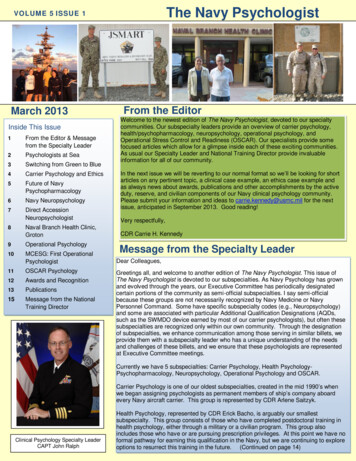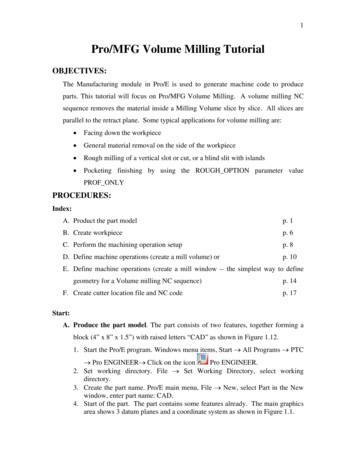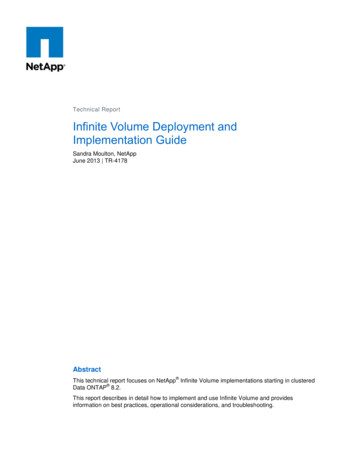
Transcription
The Navy PsychologistVOLUME 5 ISSUE 1March 2013Inside This Issue1From the Editor & Messagefrom the Specialty Leader2Psychologists at Sea3Switching from Green to Blue4Carrier Psychology and Ethics5Future of NavyPsychopharmacology6Navy Neuropsychology7Direct AccessionNeuropsychologist8Naval Branch Health Clinic,Groton9Operational Psychology10MCESG: First OperationalPsychologist11OSCAR Psychology12Awards and Recognition13Publications15Message from the NationalTraining DirectorFrom the EditorWelcome to the newest edition of The Navy Psychologist, devoted to our specialtycommunities. Our subspecialty leaders provide an overview of carrier psychology,health/psychopharmacology, neuropsychology, operational psychology, andOperational Stress Control and Readiness (OSCAR). Our specialists provide somefocused articles which allow for a glimpse inside each of these exciting communities.As usual our Specialty Leader and National Training Director provide invaluableinformation for all of our community.In the next issue we will be reverting to our normal format so we’ll be looking for shortarticles on any pertinent topic, a clinical case example, an ethics case example andas always news about awards, publications and other accomplishments by the activeduty, reserve, and civilian components of our Navy clinical psychology community.Please submit your information and ideas to carrie.kennedy@usmc.mil for the nextissue, anticipated in September 2013. Good reading!Very respectfully,CDR Carrie H. KennedyMessage from the Specialty LeaderDear Colleagues,Greetings all, and welcome to another edition of The Navy Psychologist. This issue ofThe Navy Psychologist is devoted to our subspecialties. As Navy Psychology has grownand evolved through the years, our Executive Committee has periodically designatedcertain portions of the community as semi-official subspecialties. I say semi-officialbecause these groups are not necessarily recognized by Navy Medicine or NavyPersonnel Command. Some have specific subspecialty codes (e.g., Neuropsychology)and some are associated with particular Additional Qualification Designations (AQDs,such as the SWMDO device earned by most of our carrier psychologists), but often thesesubspecialties are recognized only within our own community. Through the designationof subspecialties, we enhance communication among those serving in similar billets, weprovide them with a subspecialty leader who has a unique understanding of the needsand challenges of these billets, and we ensure that these psychologists are representedat Executive Committee meetings.Currently we have 5 subspecialties: Carrier Psychology, Health PsychologyPsychopharmacology, Neuropsychology, Operational Psychology and OSCAR.Carrier Psychology is one of our oldest subspecialties, created in the mid 1990’s whenwe began assigning psychologists as permanent members of ship’s company aboardevery Navy aircraft carrier. This group is represented by CDR Arlene Saitzyk.Clinical Psychology Specialty LeaderCAPT John RalphHealth Psychology, represented by CDR Erick Bacho, is arguably our smallestsubspecialty. This group consists of those who have completed postdoctoral training inhealth psychology, either through a military or a civilian program. This group alsoincludes those who have or are pursuing prescription privileges. At this point we have noformal pathway for earning this qualification in the Navy, but we are continuing to exploreoptions to resurrect this training in the future. (Continued on page 14)
PAGE 2THE NAVY PSYCHOLOGISTFostering Fair Winds and Following Seas: Psychologists at SeaCDR Arlene Saitzyk, Carrier Psychology Subspecialty LeaderAircraft carriers have long presented an excellent opportunity to orient psychologyinterns to the Fleet during their “week-at-sea,” and interns in the past also providedmuch needed assistance to service members while on board. Carrier Senior MedicalOfficers (SMOs) started noticing how psychologists’ quick and apt assessments andinterventions eased the severity of personal and occupational problems of the crew,decreased personnel losses to the command, and overall improved performance. Bythe mid-1990’s, one carrier SMO asked Dr. Clapp, an internship faculty member whooften accompanied interns on the carriers, to write a point paper on this very issue sothat they could consistently provide psychologists to carrier medical departments.The paper was well-taken, and propelled a series of TAD assignments ofpsychologists to the carriers. Not surprisingly, standardly providing evaluation,consultation, and treatment on board helped maintain mission readiness, andresulted in a huge costs savings for those ships. Consequently, in 1998, the fiveyear “Psychologist at Sea Demonstration Project” was launched, with psychologistsassigned to the carriers as part of ship’s company. A study comparing cost savingsbetween carriers with and without a psychologist showed the former was superiorand was about to become the wave of the future.Needless to say, psychologists are now permanent members of carrier medical departments, providing services toship’s company, embarked Air Wings, and Strike Groups. These services include urgent and routine evaluations, short-terminpatient psychiatric treatment when underway, outpatient therapy, and consultation to the command. The ship psychologistis also the clinical supervisor for the SARP (Substance Abuse Rehabilitation Program), overseeing evaluations, IMPACT(early intervention education), Level I Outpatient treatment, and the Aftercare program on board. As well as key members ofthe Health Promotions Committee, psychologists provide education and training on board, such as suicide prevention,anger/stress management, and command indoctrination classes on a variety of interpersonal issues. There’s also a gooddeal of freedom for psychologists to create programming to best meet the needs of ship personnel. For example, last yearduring deployment one psychologist facilitated a Men's Domestic Violence group, allowing substantiated Family Advocacycases to complete required counseling rather than delaying care.At present, there are 11 carrier psychologists, soon to be ten; after 51 years in the Fleet, the USS Enterprise (CVN65) is being deactivated. LCDR Purewal will be staying with the Enterprise until decommissioned. We also wish fair windsand following seas to LT Lugo-Steidel from the USS Nimitz (CVN-68), and welcome aboard to LT Myers who replaced him inJanuary 2013. LT Kraemer, now the psychologist for the USS Dwight D. Eisenhower (CVN-69) got his first taste of life at seaas a Reservist providing much needed services to Nimitz last summer. His article in this issue discusses his experience of“making the switch from the green side to the blue.” The second article from the carrier subspecialty in this issue is by LCDRLippy, who is currently stationed on the USS Carl Vinson (CVN-70). His article addresses some of the ethical quandaries weface as embedded/expeditionary psychologists, including managing dual roles and malingering. The carrier psychology email group provided great input to his article, and I’d like to thank a few regular contributors to the listserv, including LTRariden from the USS Theodore Roosevelt (CVN-71), LT Lowe from the USS Ronald Reagan (CVN-76), and CDR Heim fromthe USS John C. Stennis (CVN-74). Thank you CDR Heim for your service (he had nearly back to back deployments the pastyear, and possesses a wealth of experience, with two separate carrier tours on his resume). I’d also like to thank LT Asgaardfrom the USS Abraham Lincoln (CVN-72) who recently completed an extended deployment and home port change. LTDomery from the USS George Washington (CVN-73) and LT Ecklund from the USS Harry S. Truman (CVN-75) hit the deckrunning and have been doing great work as relatively new members of this community. And finally, welcome to our newestaddition to the Fleet (the ship that is, not the provider) LT Calvio from the USS George H.W. Bush (CVN-77). I should alsomention that due to the success of psychologists on carriers, other ships have been repeatedly requesting assistance frommental health providers. Last year, LT Ayers, a Navy clinical social worker, deployed with the USS Iwo Jima (LHD-7).While the week-at-sea is excellent orientation, a carrier tour is usually not recommended right after internship,because the psychologist must be licensed to practice independently, have experience with the line communities (especiallysurface and aviation), and be rather knowledgeable about managing alcohol treatment programs. As well, familiarity withcommunity psychology-like programs is helpful. With the heightened optempo these days, ships are increasingly interested inprevention. For example, recently several psychologists conducted command wide trainings using a train-the-trainer modelwhere senior enlisted members receive stress management/suicide awareness instruction with drills that walk leaders thoughsituations they’re likely to encounter, and offer guidance on how to help service members in their respective divisions anddepartments. Several psychologists are writing columns in command newsletters or for the Plan of the Day, providing usefultips on handling various personal and professional challenges. Psychologists have also been consulting members to humanfactors-like boards assisting leadership with concerns about sailors. One ship even has a resiliency committee that iscurrently targeting issues involving alcohol and sexual assault. Finally, the carrier psychology subspecialty is in the finalstages of a research proposal to best understand the unique needs of our population more to follow.
THE NAVY PSYCHOLOGISTPAGE 3Making the Switch: Moving From the Green Side to BlueLT Tony Kraemer, Ship’s Psychologist, USS Dwight D. Eisenhower (CVN-69)The following is a comparative look at the duties of the Psychologistcoming from the Marine Special Operations Schoolhouse (MSOS)transitioning to duty as Ship’s Psychologist on the USS Dwight D.Eisenhower (CVN-69).BLUF: It is very different!As the Psychologist at MSOS, I did some clinicalcounseling, but primary duties focused mostly on assessmentand selection, and consultation/training for the Survival, Evasion,Resistance, and Escape/Personnel Recovery (SERE/PR) programs.Most of the clinical work was done by a clinical psychologist,or by the clinic on Camp Lejeune. This was largely because theMSOS psychologist could not provide the consistency necessaryfor a good therapeutic relationship and it was important not to mixthe roles of operational and clinical psychologist.Fortunately, I served briefly as a Reservist on the USS Nimitz (CVN-68) for about two months in 2011. Theship was in the yards, the hours were fairly set, and I got to go home (to the hotel!) at night. However, the pace wasintense, and the needs of the crew provided a sampling of the kind of things I could expect on the Eisenhower. I’vebeen the Ship’s Psychologist on the Eisenhower now for about four months, and have seen sailors for variousproblems, ranging from marital and family issues, and adjustment disorders, to more severe depressive symptoms,suicidal ideation, and self-directed violence. I’ve also provided input for a number of security evaluations andcompleted command directed mental health evaluations on board. As well, the ship’s psychologist is involved in theship’s Human Factors Committee, advising the command on issues related to the psychological health and well beingof the crew in general. In many respects, the experience at MSOS nicely transferred to the shipboard environment –two examples are my comfort with “passageway consults” and my experience with health promotion activities, or moreof a community-based psychological perspective on issues. Another interesting crossover I have encountered is theSERE/PR training I received while at MSOS. At MSOS, I was able to observe the training and preparation of servicemembers for the possibility of capture or retention by foreign forces. This training has proven quite useful on the ship,as many of the Air Wing and Strike Group personnel have also gone through this training, allowing me a commonfooting to have therapeutic conversations with this often rather closed group. In addition, it has provided theopportunity to be involved with training exercises and to interact withpersonnel from the Joint Personnel Recovery Agency while on board.So, there has been a definite shift in duties and priorities. Thehours on board ship are long, and while the temperature fluctuates, thenoise is, well, constant. Patient care is much more of a focus here,especially while deployed. The ship is self-contained while ondeployment (sometimes sailors are placed on the ship’s medical wardfor stabilization), although some sailors just can’t be effectively treatedon board. An excellent relationship with the ship’s other medicalproviders is a must, as is staying on top of records. Having positiverelationships with medical providers in ports, whether at homeport or inforeign ports (like Bahrain) are critical. While the differences aredefinitely there, the work is equally rewarding.To read more about psychology at sea please tle-groups2/10588.html
PAGE 4THE NAVY PSYCHOLOGISTEthical Challenges of a Carrier PsychologistLCDR Robert Lippy, Ship’s Psychologist, USS Carl Vinson (CVN-70; pictured on the left)There are many ethical dilemmas I have encountered as an aircraftcarrier psychologist that have made this the most rewarding andchallenging billet in my Naval career. These include multiple relationships(patients may cut your hair, serve your food, or clean your stateroom),boundaries of competence (being the only mental health provider for theStrike Group, doing our best to treat whatever comes through the door),privacy issues, and record keeping. Perhaps the toughest ethical issue ismalingering. Malingering, the intentional reporting of false or grosslyexaggerated symptoms for external incentives, is an issue faced by Navypsychologists because of the significant secondary gain (e.g., to get outof duty/watch, avoid deploying, keep away from working with intolerableothers, or separate from the Navy altogether). On an aircraft carrier thestakes are high. If you have never served onboard a ship it might behard to fathom the rigors of shipboard life. Stressors include long workhours, cramped living conditions, lack of personal space, constant drillsand evolutions throughout the ship, seemingly unending qualifications and inspections, and rotating watch schedules. Thesestressors take on added significance for sailors new to the Navy, new to a ship, and new to deployments. The reality of being“stuck” to endure these conditions for the next several years can be daunting, depressing, and anxiety-provoking. I have heardmany describe life onboard as a “prison sentence.” Despite exaggeration of symptoms, the distress is real and a somewhatexpected reaction to the difficulties of adjusting to this arduous lifestyle.Principle A of the APA Ethics Code states that “psychologists strive to benefit those with whom they work and take careto do no harm.” So what is in the best interests of a sailor who is in such distress as to believe the only way for relief is byreturn to civilian life? The sailor believes what is in their best interest is to be let out of their contract via administrativeseparation. The chain of command’s response typically depends on the attitudes of the leadership. Some leaders have littlesympathy for these sailors and expect them to fulfill their contracts (and do all they can to ensure this happens, sometimesmaking life even more intolerable for the sailor). Other leaders take the view that these sailors are a “lost cause” and the bestthing is to cut our losses and proceed with administrative separation. Each of us as Navy psychologists has likely developedour own attitudes for how we handle the complex issue of malingering and have our own threshold for determining when toproceed with recommending administration separation. Complicating this issue on an aircraft carrier is the fact thatpsychologists are part of the same command as our patients, supporting the command’s mission of combat readiness byensuring the mental well-being of its sailors. We have a responsibility to both our patients and our CO. Do we support thecommand’s mission of retention, or the wishes of our patients to help them out of their contract because of difficulties adjustingto shipboard life? In general, I tend to have a high threshold for separation. Just as exposure therapy requires confrontinganxiety-provoking situations, I believe helping a patient tolerate and work through their distress is both clinically and ethicallysound. Only after I have exhausted all my skills to help a sailor adjust or when it reaches the point of causing genuinelyheightened risk for harm will I consider recommending separation. I realize some may not agree with me.I admit I can occasionally become overwhelmed by this issue, and remind myself I am seeing a skewed sample of thepopulation. The majority of sailors onboard are highly motivated and hard working. It is inspiring to watch them carry out theirduties with pride, precision, and professionalism. I feel humbled to serve on this great warship and do my part helping sailorsand supporting the command’s mission. I would encourage anyone considering a carrier psychologist billet to take thechallenge and go for it!LT Lisseth Calvio:Ship’s Psychologist, USSGeorge Bush, CVN-77USS Nimitz, CVN-68Ship’s Medical DepartmentLT Lugo-Steidel: Outgoing Ship’sPsychologist, USS Nimitz, CVN-68
THE NAVY PSYCHOLOGISTPAGE 5Health Psychology/Psychopharmacology: Where we’ve been where we’re going.CDR Erik Bacho, Health/Psychopharmacology Subspecialty LeaderWe’re back! The focus of Navy fellowship training in recent years hasbeen on neuropsychology due to the large numbers of blastconcussions seen during the war. This is changing. With the inventoryof neuropsychologists reaching healthy levels, senior Navy Psychologyleadership will be considering offering fellowships in areas that havebeen dormant. Health Psychology/Psychopharmacology fellowshipsare again moving to the fore.This brief update will review the state of Navy HealthPsychology and Psychopharmacology subspecialties. For the pastseveral years, Navy psychology has taken a war-time footing, in orderto meet operational demands. More recently, there has been a downshift in Iraq and an impending draw down in Afghanistan. This hasfound more Navy psychologists returning to their traditional roles inMTF’s, expanding their roles in primary care settings and continuingtheir embedded roles on ships and with Marine infantry units.The advent of embedded Behavioral Health specialists inMedical Homeports deserves special mention here as it will be a majorfocus of Navy health psychologists/prescribing psychologists in the years to come. Psychologists routinely work withpatients who require knowledge about complex interactions between medical conditions and psychological pathologyand states. Frequently, psychologists are asked to help treat patients diagnosed with co-morbid medical andpsychological conditions. Typically, these conditions co-occur in the context of complex social, logistical, and military orcultural barriers. These barriers often adversely impact the patient’s access to care. There is a growing need for trainingin understanding pathophysiology, healthy lifestyles, and psychopharmacology, as psychologists have become anintegral part of the medical team. As such, there is a need to train psychologists to meet the challenges of this shiftingwork environment that reflects a return to a peace-time footing in the coming years.Between 2005 and 2009, a Navy Health Psychology Fellowship was offered in an effort to expand Navypostdoctoral training opportunities, provide psychologists with a path toward prescription privileges, and to serve as aretention tool. The Health Psychology Fellowship Program at Tripler Army Medical Center (TAMC) in Honolulu, Hawaiiwas selected as the primary site for this training. In addition to the Health Psychology curriculum, it offeredcertification in psychopharmacology. This gave graduates of the program the foundation for prescribing psychotropicmedications and applying their skills in interdisciplinary environments, including primary care settings. From 2005to 2009 there were 3 Navy graduates of this program, all of whom were equipped with the basic training foundation topursue prescription privileges in the fleet. While the Navy's relationship with the TAMC fellowship ended in 2009,we are considering re-instituting this fellowship as our community's manning improves. A new version of the TAMCprogram has been implemented with new leadership and faculty, as well as a new partnership with the University ofHawaii-Hilo. This promises to be a top-notch program that has the potential to provide a unique training opportunity forNavy psychologists. Also under consideration is a less formal training program in which psychologists would have theoption of training under prescribing psychologists based in Annapolis, Walter Reed and Fort Belvoir, as well as thecreation of a prescribing psychology fellowship in the National Capital area. More to come Read about the first DoD prescribing psychologists: http://www.apa.org/monitor/feb03/prescribers.aspx spxKeep up to date as to prescribing psychology and state laws: http://www.prescribingpsychologist.com/Check out American Psychological Association, Division 55, American Society for the Advancement of Pharmacotherapy:http://www.division55.org/
PAGE 6THE NAVY PSYCHOLOGISTNavy NeuropsychologyCDR Carrie Kennedy, Neuropsychology Subspecialty LeaderNavy neuropsychology has undergone massive changes in the past ten years. From acommunity that regularly maintained only 3-4 active duty neuropsychologists at a time toone in which we haven’t been able to procure and grow enough, we have been a muchneeded clinical specialty in order to meet the needs of the warfighter. Blast concussionand combat stress issues have been the predominant clinical foci of this war forneuropsychologists. Understanding the sequelae of blast concussion, interactionsbetween concussion and combat trauma, implementing cognitive screening strategiesboth predeployment and in the war zone and providing mandated neuropsychologicalevaluations on warfighters in the combat zone have defined active dutyneuropsychology during the war in Afghanistan. As the war winds down, these sameneuropsychologists will be meeting the unique needs of veterans for years to come.In combination with recent news reports about the effects of concussion onathletes, the urgency to appropriately assess and safely return to duty those with blastconcussions has been significant. Neuropsychologists have been in a unique position tomeet this need, but in order to do that effectively we had to grow. Growing a robustneuropsychology community hasn’t been fast. It takes almost 18 months fromannouncement of an allotted fellowship slot to commencement of the fellowship. Thefellowship itself consists of two years of formal post-doctoral training to meet theminimum standards for credentialing as a Navy neuropsychologist. Consequently, eventhough the community has been aggressively addressing the manning issue, it has taken us 5 years to grow from 3 active dutyneuropsychologists to 7 (CAPT Tony Arita, CDR Robert Obrecht, CDR Carrie Kennedy, CDR Randy Reese, LCDR ShawnnaChee, LCDR Porter Evans and LT Ana Soper). This will increase to 9 in just a few months when our existing fellows graduate(LCDR Josh Kenton, UCSD and LCDR Efland Amerson, UVA).For neuropsychologists, this war marks the first time that we have been needed and utilized near the front lines. Three ofour neuropsychologists practiced neuropsychology in the war zone assessing acutely concussed service members and providingmandatory neuropsychological evaluations to those who sustained multiple concussions. Two of our neuropsychologists haverecently arrived in Afghanistan. LCDR Chee is deployed to the Concussion Restoration Care Center on Camp Leatherneck andCDR Reese is deployed to Kandahar Air Field. If we are still in Afghanistan at the time of their departure the plan is to replace atleast one of them with another Navy neuropsychologist.We are fortunate to have two preferred training sites which have tailored their existing fellowship programs to meet thetraining needs of Navy neuropsychologists. Under the leadership of Dr. Jeffrey Barth of the University of Virginia and Dr. BillPerry of the University of California San Diego, we have robust training programs that provide the highest quality training withspecial emphasis on concussion, military populations and the neurologic conditions most often seen in active and retired militarypopulations.War and specialty population requirements have also provided a need for Navy neuropsychology to become moreintegrated into all of our military treatment facilities. We now have coded billets for neuropsychologists at Camp Pendleton, NavalMedical Center Portsmouth, Naval Medical Center San Diego, Camp Lejeune and Naval Aerospace Medical Institute. To furthermeet the needs of our combat veterans we are looking at recoding billets at both Camp Lejeune, which would then have twoneuropsychology billets, and Walter Reed. While in the past, neuropsychologists often only served one tour as aneuropsychologist, the increased needs at military concussion/TBI centers and military hospitals have created the need forspecialists to serve in more than one billet as a neuropsychologist. This is good news for Navy neuropsychologists who havehistorically been faced with the reality of having to PCS to a non-neuropsychology billet and risk skill degradation or face thedecision to leave the military to remain focused on the clinical specialty.The future of Navy neuropsychology is robust. By this time next year we will likely have 7 coded billets and 9 active dutyneuropsychologists in the fleet. We have asked the Navy for two fellowship slots to begin in 2014 and are waiting to hear whichDUINS slots will be offered for the Medical Service Corps.LCDR Chee, CampLeatherneck, HelmandProvince, AfghanistanCDR Monahan (nowretired) and CAPT TonyArita, ConcussionManagement Training,Okinawa, Japan
THE NAVY PSYCHOLOGISTPAGE 7Trails B: The Journey of a Direct Accession NeuropsychologistLT Ana Soper, Marine Corps Recruit Depot, Parris IslandDo you recall the moment when you realized you were taking the “trails” lesstraveled by choosing to transition from civilian to officer? Although this was notthe trail I had planned to take, the experience of being new to the Navy hasgiven me some of the most broadening and poignant moments of my life (e.g.,hearing Old Glory read aloud for the first time). In case you haven’t heard,neuropsychologists can be a bit on the “thorough” side. As a Veterans Affairs(VA) staff neuropsychologist, I had a 30-year future career mapped out in detail,until I heard a life-changing talk given by a Navy neuropsychologist featuring thepractice of neuropsychology in the Navy (in theater), and who spoke highly of theNavy’s people. Come to find out that in the Navy you really do get to run withsome amazing people literally.My first duty station is at Naval Hospital Beaufort, South Carolina,serving Marine Corps Recruit Depot (MCRD) Parris Island, the USMC’s EastCoast recruit command. As an early career neuropsychologist, I am engaged inopportunities I would only have dreamt of receiving later in my career had Iremained in a civilian health care system. First, neuropsychology services havenot previously been provided here and I have had the opportunity to develop aneuropsychology service at our hospital and to get a new cognitive rehabilitationcomponent of a stress management program up and running. The Departmentof Defense (DoD) has promoted provider awareness of concussion and TBI well,in my observation. My command was extremely supportive and well-informedabout what I do as a neuropsychologist.I work within a hospital that serves Marines and Sailors who have servedin combat, an extraordinary opportunity for a neuropsychologist who specializesin TBI assessment. However, given the additional patient population of retireesand dependents, it is also possible to see the full complement ofLT Soper’s first saluteneuropsychology cases that we would see in an adult general practice. Anotherway of looking at this experience is that you will never feel so valued as when your boots hit the ground at a smallcommand, AND when people find out you are a neuropsychologist.A few parting words applicable to direct accession neuropsychologists:1) As a civilian neuropsychologist, you may be accustomed to being embedded within a large team of rehabilitationprofessionals as I was. In rehabilitation-speak, Navy Medicine is now your interdisciplinary team! Early outreachof those within my specialty community (e.g., regional colleagues at the Camp Lejeune Marine and SailorConcussion Recovery Center) was critical. If you are new to the Navy, you will be part of a strong professionalnetwork. Our specialty leader greatly facilitates this. You will also certainly receive my warm welcome and offerof assistance!2) My formative clinical experiences were through the VA health care system, which helped with readiness to serveour population. I recommend the high-caliber VA fellowship grads as a pipeline for our direct accessions. As wemove toward inter-agency “jointness,” it w
Dear Colleagues,Psychologist Greetings all, and welcome to another edition of The Navy Psychologist. This issue of The Navy Psychologist is devoted to our subspecialties. As Navy Psychology has grown and evolved through the years, our Executive Committee has periodically designated certain portions of the community as semi-official subspecialties.











